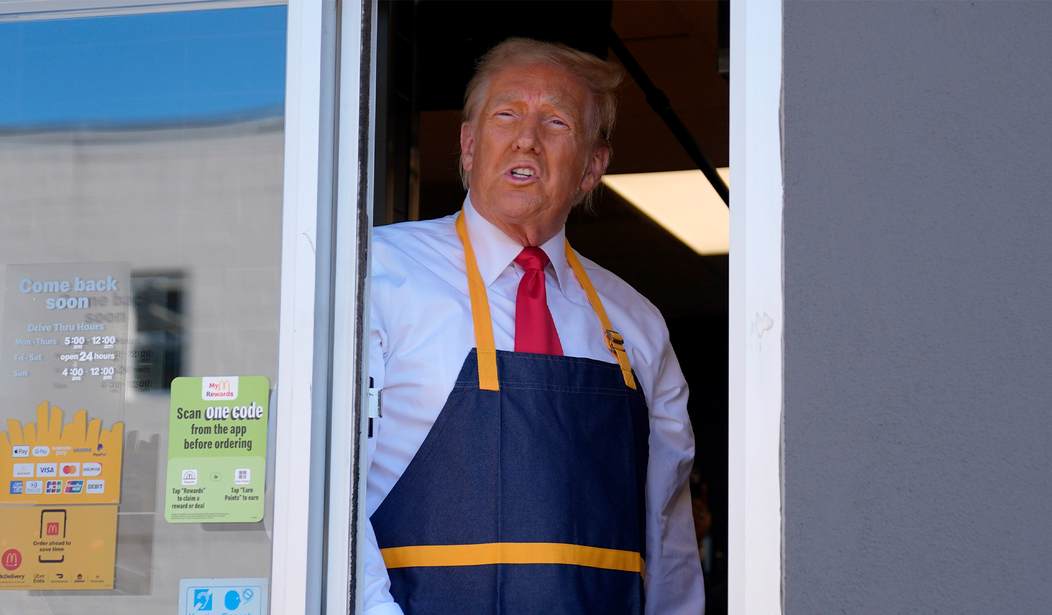The trouble for the left won't stop with what was probably one of the most brilliant campaign moves by Donald Trump.
For those who haven't been around a working screen in a few days, Trump went and worked a shift at a McDonald's restaurant, the fallout of which has been delicious to behold.
You know it's a brilliant move when the left goes apoplectic over it, and they definitely have been.
(READ: MSNBC Goes Into Full Meltdown Mode As Trump Gets Huge Crowd and Cheers at McDonald's)
It was a move that embarrassed Kamala Harris so thoroughly that, even as Piers Morgan noted, it will probably fry her at the ballot box:
The second reason why Trump’s stunt worked so effectively is because McDonald’s is about the purest personification imaginable of the American free market dream — a place where everyone can afford to eat, and equally, where everyone has a shot at potentially running a McDonald’s franchise one day.
There are 13,562 McDonald’s restaurants in America, a third of all the McDonald’s outlets in the entire world.
They’re in all 50 states, spread across over 5,000 cities.
And they serve 25 million people a day, approximately 7.5% of the US population.
Staggeringly, nearly 9 out of 10 American households visited McDonald’s at least once in the past year.
And the No. 1 biggest-selling item on the menu is the original, basic french fries.
So when Donald Trump announced, “I’ve always wanted to work at McDonald’s” as he arrived yesterday, and then donned his apron to start preparing those very fries, he was tapping directly into a job that so many of his countrymen can instantly relate to.
Morgan's last sentence, I think, prompts a very interesting thought. He makes it sound like Trump walked into a restaurant, learned how to make the food, and just started working... which is exactly what happened. It took minimal training to know how to be a McDonald's employee.
It kind of makes you wonder why the push for these employees getting $15 an hour or more is so successful.
It was a question that Trump was actually asked while he was doing his job, and it was one that he avoided answering completely. I can't help but think he avoided answering the question because he couldn't help but wonder the same thing.
After working the fryer at McDonald’s, I asked Trump if he thinks the minimum wage should be raised: “Well I think this. These people work hard. They’re great. And I just saw something… a process that’s beautiful,” Trump said. pic.twitter.com/pg2synNA59
— Olivia Rinaldi (@olivialarinaldi) October 20, 2024
Hiking the minimum wage doesn't really help many people, including McDonald's employees. As the Heartland Institute covered back in June here on RedState, the findings of raising the minimum wage resulted in losses across the board:
A study by the Congressional Budget Office found that increasing the federal minimum wage by incremental degrees to $15 per hour by 2025 would adversely affect employment and household incomes. While the study does find that a minimum wage increase boosts some workers’ wages, it also leads to job loss for many others, with small businesses often bearing the brunt of the lost jobs.
The impact of large minimum wage increases on small businesses is substantial, forcing them to reallocate scarce resources from profit-generating enterprises toward higher labor costs. Often, this results in lower hiring levels, work-hour reductions, layoffs, and increased prices for consumers.
These points are all claims that opponents of minimum wage hikes have cited for years. Despite the warnings, many deep-blue cities and states continue to push for these minimum wage increases despite the documented harms they inflict on the labor force.
According to the U.S. Bureau of Labor Statistics, California maintains a 5.3 percent unemployment rate. With potential economic uncertainty ahead, making any policy decisions that may lead to an increase in this rate should be avoided at all costs.
The increased prices for consumers are also something that will probably get people talking. While habitual virtue signalers may like to say they're willing to pay extra for their Chicken McNuggets, the people who end up buying these meals more often than not don't exactly have thick wallets. For them, the extra two dollars is actually something they feel the impact of, while the virtue signalers might not even notice the money leave their account.
Too often, virtue signaling is expensive for the poor.
It's probably a good thing to bring up the fact that minimum wage is actually hurting the poor more than it's helping them. It's hard to make a living wage when you can't get a job because the minimum wage is being sucked up by fewer employees.
I understand Trump avoiding talking about it at that moment. This isn't exactly something that's easily explained in a soundbite, but part of saving this economy is going to be getting to a point where we can comfortably reduce the minimum wage and bring more people back into the workforce, and moreover, have prices come down on food items.














